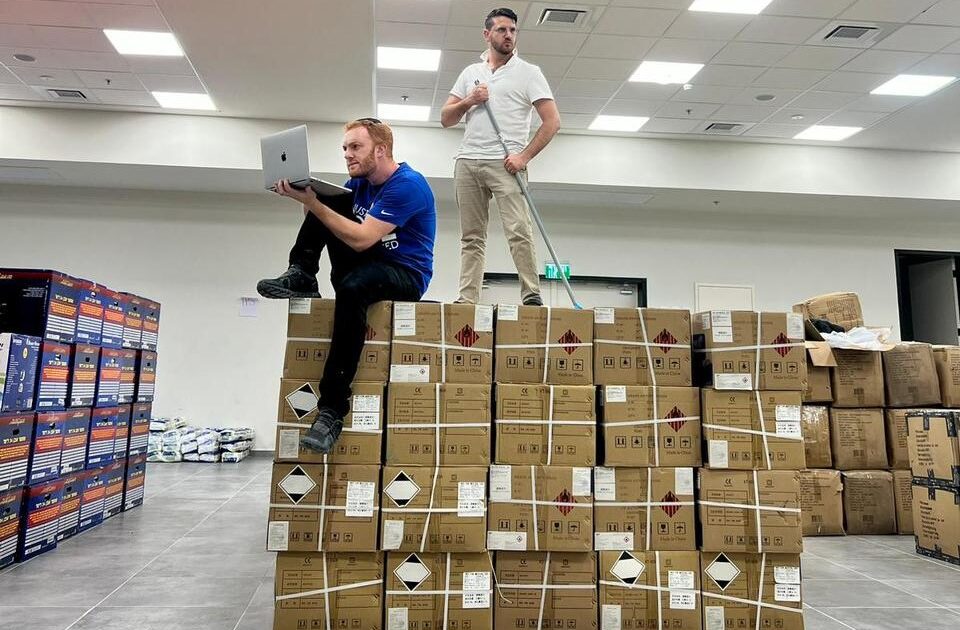Israel
Mourning together, working together – olim join war effort

South African olim have joined the many Israelis who haven’t been called up in volunteering to help the war effort. Here are the stories of just a few.
Dave Bloom, originally from Harare, Zimbabwe, made aliya in 1974 and has been a Telfed volunteer for more than 25 years. Chairperson of the lone soldiers committee, Bloom said, “We have 120 lone soldiers that we take care of. Our job is to get in touch with them to check how they are doing, and assist them with anything else they may need. That can be socks, underwear, laundry, or food.
“I had a mother overseas phone me recently saying that her son who is serving in the army is about to celebrate his 20th birthday and wanting to see if we could organise a birthday cake to be delivered to his army base. We were able to do it, and it was amazing in lifting morale,” said Bloom.
Bloom has also organised Zoom support sessions for soldiers’ families around the world, bringing psychologists into these sessions to give them the support they need.
And he has been involved in helping the 130 000 refugees from the kibbutzim in the north and south of Israel who are now living in the centre of the country. “I was approached to see if we could buy laptops for children who had to leave their homes so they could attend school,” he said. “It’s not easy for them being so far away from home, and often these families had to flee their homes with only the clothes on their backs and what they could grab.” He was able to get 40 laptops to distribute to the children as well as some adults so that they could continue to work remotely. “They were so grateful to have some sort of normalcy,” said Bloom.
Daniel Taitz and Wayne Gluckman, old friends from their days at Yeshiva College, have been working together with the organisation JustOneChesed in which Gluckman is the director of technology and Taitz regularly volunteers. When war broke out, the pair wanted to help. JustOneChesed was faced with more than 1 000 families who had to leave their homes and were living in Beit Shemesh in empty apartments allocated to them.
“We wanted to find a way to kit out these apartments to make them comfortable for the families. Within a few days, we were set up with a warehouse and had created an online platform to make sure that these families get whatever they need. We have baby items like nappies, appliances like toaster ovens and kettles, even second-hand furniture,” said Gluckman.
“People can place orders for what they need and what they want to donate, and then the families come and collect what we have for them. We’ve been able to talk to the families and see how dire their situation is,” said Taitz. “Right now we’re distributing everything in our warehouse in Beit Shemesh, and have helped more than 1 000 families,” said Gluckman.
Eli Rudolph and Kayla Glick, members of the Shivtei community in Ra’anana, made aliya 11 years ago, Rudolph with her husband and two young children – a third was born in Israel – and Glick as a tween of just 12 years old with her parents and three younger siblings.
Rudolph is the co-ordinator of chesed for the Shivtei community, and works for My Israel, an organisation that assists small charities in the country.
Glick, a student at Hebrew University studying biology and business, had completed her first year and was enjoying the last week of the summer holiday while looking for an internship when the war started and all studies were suspended. She was at a loose end, but was determined to help in any way she could.
Within half an hour of turning on her phone on the night of 7 October, Rudolph was fielding multiple offers of assistance from the community, and by the next day, the requests started coming in – up to 15 a day from army bases needing food and supplies for up to 60 soldiers at a time.
The donations poured in, and Rudolph’s house became the collection point for drop-offs. Every day, she co-ordinates the efforts of multiple volunteers who come past to help her pack and prepare the donated supplies which are sent out to the bases between five and six times a day.
Glick converted her garage into a shop for Ra’anana’s soldiers. “We don’t want the soldiers to waste their precious time at home trying to shop,” she said. “This way they can come in, pick up anything they need, and then spend time with their families.” The shop offers everything from toiletries and snacks to chargers, socks, and underwear.
“The response has been unbelievable,” said Glick “People have been bringing stuff constantly.” “Everyone has given whatever they can, whether they are rich or poor,” said Rudolph.
“This is how we survive. We unite to get things done. We mourn together, and we work together,” she said.
